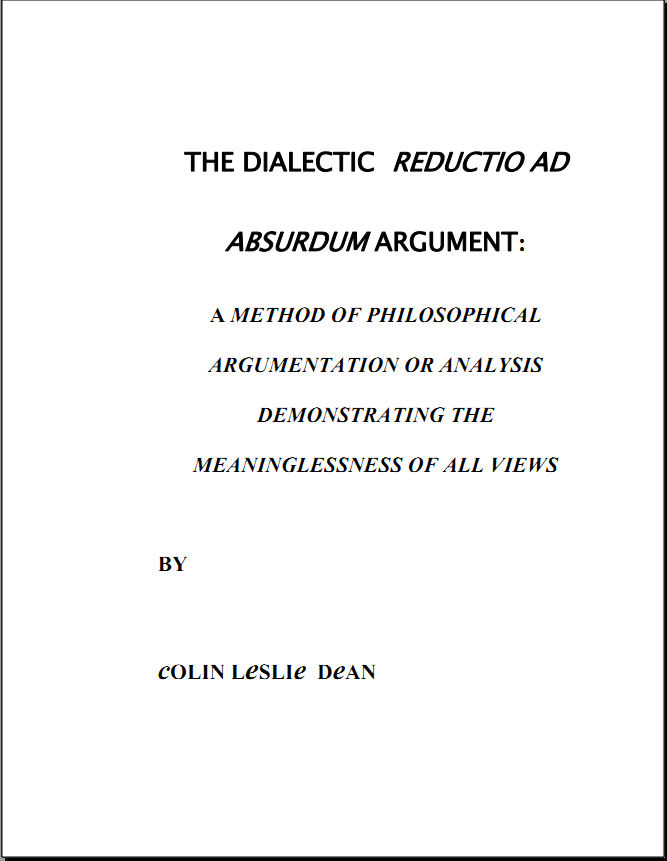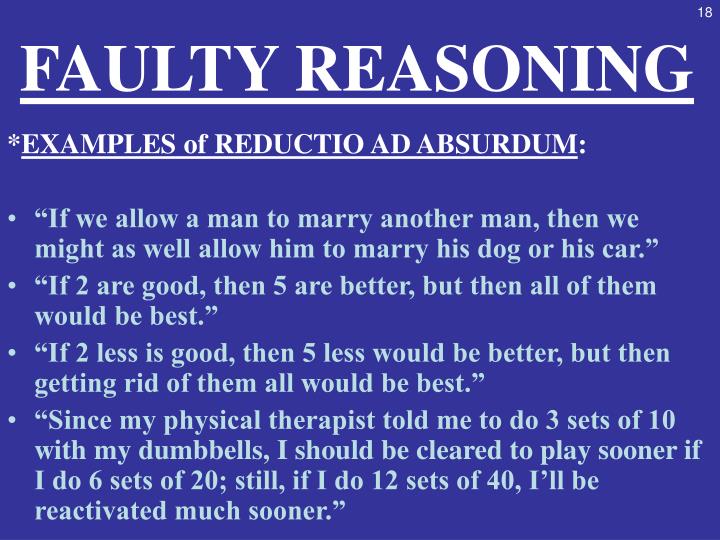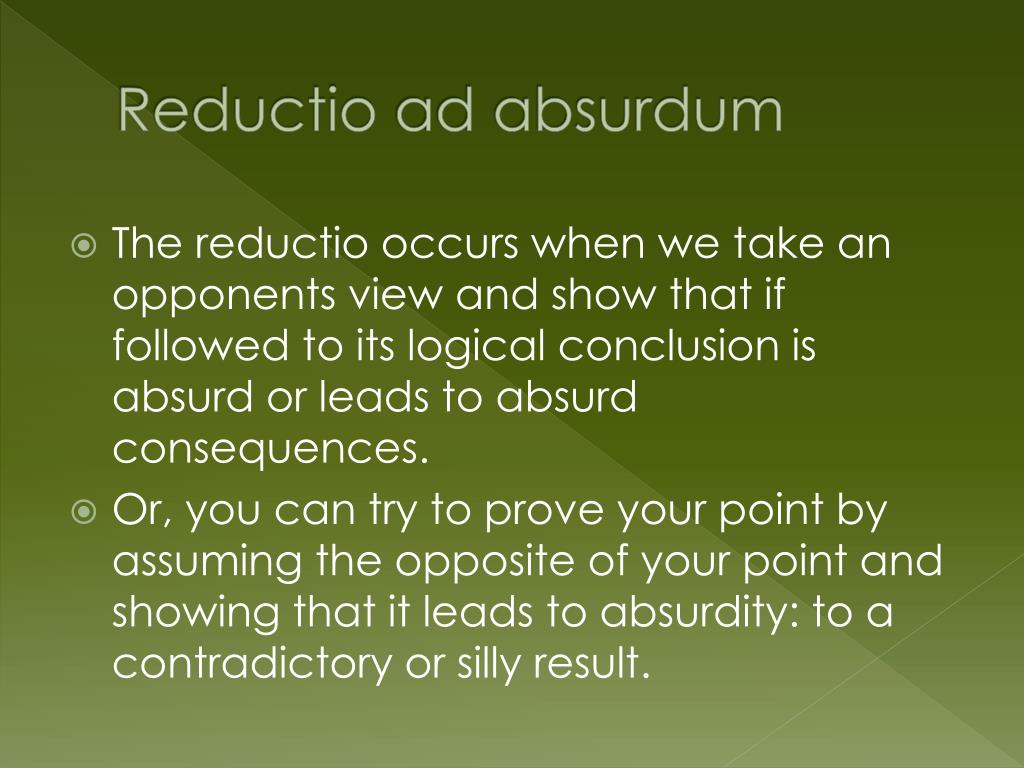
Reductio ad absurdum Wikipedia
8. Reductio ad Absurdum 8.1 A historical example. In his book, The Two New Sciences, Galileo Galilea (1564-1642) gives several arguments meant to demonstrate that there can be no such thing as actual infinities or actual infinitesimals. One of his arguments can be reconstructed in the following way. Galileo proposes that we take as a premise that there is an actual infinity of natural numbers.

(PDF) Argumentum ad Absurdum and the Rational Legislator Assumption Critical Analysis Marcin
In simple words, it means to reduce an argument to absurdity, by drawing conclusions with logical limits, or by showing ridiculous consequences. Reductio ad absurdum in satires breaks down an idea to the point of absurdity. Difference Between Reductio ad Absurdum and Appeal to Ridicule

PPT Anselm of Canterbury (10331109) PowerPoint Presentation, free download ID5507070
A form of the reductio ad absurdum argument, known as indirect proof or reductio ad impossibile, is one that proves a proposition by showing that its denial conjoined with other propositions previously proved or accepted leads to a contradiction. In common speech the term reductio ad absurdum refers to anything pushed to absurd extremes.

Reduction Ad Absurdum Definition, Meaning, Synonyms Reductio Ad Absurdum Examples English
Appeal to ridicule (also called appeal to mockery, ad absurdo, or the horse laugh) [1] is an informal fallacy which presents an opponent's argument as absurd, ridiculous, or humorous, and therefore not worthy of serious consideration. Description

Reductio Ad Absurdum Definition & Examples of Reductio Ad Absurdum Fallacy Efortless English
noun re· duc· tio ad ab· sur· dum ri-ˈdək-tē-ˌō-ˌad-əb-ˈsər-dəm -ˈdək-sē-ō-, -shē-, -ˈzər- 1 : disproof of a proposition by showing an absurdity to which it leads when carried to its logical conclusion 2 : the carrying of something to an absurd extreme Examples of reductio ad absurdum in a Sentence

In logic, reductio ad absurdum (Latin for "reduction to absurdity"), also known as argumentum ad
reductio ad absurdum (also known as: reduce to absurdity) Description: A mode of argumentation or a form of argument in which a proposition is disproven by following its implications logically to an absurd conclusion. Arguments that use universals such as, "always", "never", "everyone", "nobody", etc., are prone to being reduced to absurd conclusions.

Reduction Ad Absurdum Definition, Meaning, Synonyms Reductio Ad Absurdum Examples English
The ad absurdum argument can be understood either as a strictly logical tool, which is equivalent to a proof by contradiction, or as a pragmatic argument about the desirability or undesirability of a given proposition. Yet, in legal reasoning lawyers tend to use it, at least in the vast majority of cases, only in the latter sense. The argumentum ad absurdum, as I will argue, can be classified.

The dialectic reductio ad absurdum argument Gamahucher Press
Reductio ad absurdum. Reductio ad absurdum, Latin for "reduction to the absurd," traceable back to the Greek ἡ εις άτοπον απαγωγη (hê eis átopon apagogê), "reduction to the impossible," is a form of argument where one provisionally assumes one or more claims, derives a contradiction from them, and then concludes that at.

Conditional Proof and Reductio ad Absurdum Logic, Reductio ad absurdum, Rhetoric
Outcomes: Reductio ad Absurdum vs. Argument from Consequences HENRIKE JANSEN Leiden University Abstract: Used informally, the Reductio ad Absurdum (RAA) consists in reasoning appealing to the logically implied, absurd consequences of a hypothetical proposition, in order to refute it. This kind of reasoning resembles the Argument from Consequences,

Skeptical Jesus v Anarchyball Uncle Sam's Gang and Ancap (Argumentum ad Absurdum) YouTube
In logic, reductio ad absurdum ( Latin for "reduction to absurdity"), also known as argumentum ad absurdum ( Latin for "argument to absurdity") or apagogical arguments, is the form of argument that attempts to establish a claim by showing that the opposite scenario would lead to absurdity or contradiction.

PPT IV. FAULTY REASONING PowerPoint Presentation ID3000047
Argumentum ad absurdum and the rational legislator assumption - critical analysis . 1. Introduction. The aim of this paper is to analyse the nature and structure of ad absurdum arguments

Red herring fallacy trump vividlader
In logic, reductio ad absurdum ( Latin for "reduction to absurdity"), also known as argumentum ad absurdum ( Latin for "argument to absurdity") or apagogical arguments, is the form of argument that attempts to establish a claim by showing that the opposite scenario would lead to absurdity or contradiction. [1] [2] [3] [4]

Deductive Arguments Part 4 Reductio ad Absurdum YouTube
In logic, reductio ad absurdum (Latin for "reduction to absurdity"), also known as argumentum ad absurdum (Latin for "argument to absurdity"), apagogical arguments or the appeal to extremes, is a form of argument that attempts either to disprove a statement by showing it inevitably leads to a ridiculous, absurd, or impractical conclusion, or to prove one by showing that if it were not true.

Reductio ad absurdum Meaning YouTube
Reductio ad absurdum is a method of argumentation that involves refuting a proposition by demonstrating an absurd outcome if the proposition is assumed true. This method it involves extending the implications of an argument to a stage of absurdity, thereby disproving the validity or common sense of the argument itself.

PPT Unit 6 Seminar PowerPoint Presentation, free download ID1016390
Reductio ad absurdum is a mode of argumentation that seeks to establish a contention by deriving an absurdity from its denial, thus arguing that a thesis must be accepted because its rejection would be untenable. It is a style of reasoning that has been employed throughout the history of mathematics and philosophy from classical antiquity onwards.
Reductio ad Absurdum
Reductio ad absurdum is when a system of logic is applied to arrive at an inconsistency (absurdity). Doing this demonstrates that the system of logic is inconsistent (broken). Reductio ad absurdum can be used to attack a specific argument when it's done using only that specific argument and well-accepted premises.